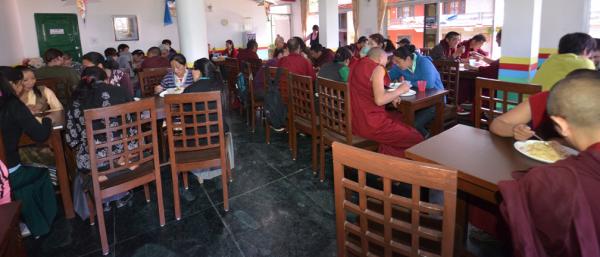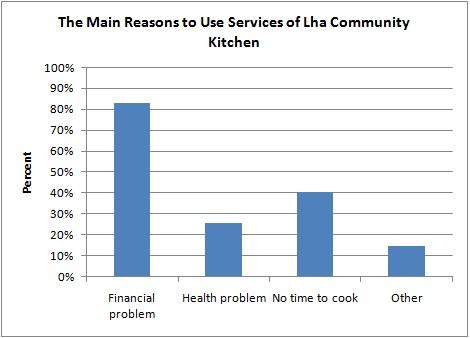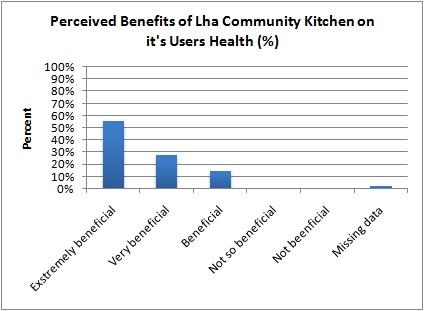Survey Report on Lha Community Soup Kitchen
On July 6th, 2011, Lha opened its Community Soup Kitchen in its new building, Ahimsa House. This became the first soup kitchen in Dharamsala that serves low-cost and nutritious meals to the Tibetan refugee community. Refugees take advantage of this beneficial service for a nominal fee of 15 rupees per person per meal, but meals are completely free for those who cannot afford to pay this amount. 91% of Lha Community Kitchen users pay 15 rupees for lunch, while 9% get lunch for free.

In June 2013 a survey of 47 users of the community soup kitchen was administered in order to assess the effectiveness of the services being provided as well as to identify areas for improvement. This survey found that 70% of Lha Community Kitchen Users are current Lha students, and 94% of users are between 21 and 40 years of age. Both men and women utilize services of the Lha Community Kitchen in a similar proportion.
In regards to the financial situation of the soup kitchen users, nearly all of the users are unemployed, with only one out of 47 users reporting as employed. Only 6 (13%) Lha Community Kitchen users receive support from family, friends or a sponsor. 8 of the surveyed users report to be on the CTA poverty list. The majority of Lha Community Kitchen users pay 1,500-3,000 rupees for monthly rent and 2,000-3,000 rupees for food every month. Users report to use the soup kitchen mostly due to financial problems but other reasons include lack of time available to cook and health problems.
 The kitchens first and foremost objective is to provide refugees with low-cost and nutritious meals while educating them about healthy eating and living. There is an obvious demand for these services, as health issues appear to be a major concern for many soup kitchen users, with 51% of users reported to have health problems. However, the community soup kitchen has been beneficial in providing well-rounded meals and clean drinking water for all of its users. This source of pure, clean water is important because 81% of Lha Community Kitchen users regularly drink tap water. In addition, the community soup kitchen provides a valuable source of fruit in every meal. This is particularly important because 21% of Lha Community Kitchen users consume only fruit provided at the soup kitchen. 36% of users have only one serving of fruit per week and 17% of users have two servings of fruit per week, indicating a deficiency in this key food group.
The kitchens first and foremost objective is to provide refugees with low-cost and nutritious meals while educating them about healthy eating and living. There is an obvious demand for these services, as health issues appear to be a major concern for many soup kitchen users, with 51% of users reported to have health problems. However, the community soup kitchen has been beneficial in providing well-rounded meals and clean drinking water for all of its users. This source of pure, clean water is important because 81% of Lha Community Kitchen users regularly drink tap water. In addition, the community soup kitchen provides a valuable source of fruit in every meal. This is particularly important because 21% of Lha Community Kitchen users consume only fruit provided at the soup kitchen. 36% of users have only one serving of fruit per week and 17% of users have two servings of fruit per week, indicating a deficiency in this key food group.
In addition to the tangible nutritional benefits that the soup kitchen provides its users daily, Lha’s community soup kitchen undoubtedly provides a much needed source of support and community for its users. This is evident in the figures, as almost half (45%) of Lha Community Kitchen users don't have any family members at the place where they currently live and 28% of users have only one to four family members in Dharamsala. The majority (85%) of Lha Community Kitchen users were born in Tibet, while the remaining users were born in India.
 Feedback given from users is very positive. Comments from users include “Lha kitchen is good for the newcomers from Tibet who don't have any financial support and I request that they will continue the service.” and “We should be proud of this social service organization in our community. I wish its service will last forever. Thank you!”
Feedback given from users is very positive. Comments from users include “Lha kitchen is good for the newcomers from Tibet who don't have any financial support and I request that they will continue the service.” and “We should be proud of this social service organization in our community. I wish its service will last forever. Thank you!”
This survey was supervised and conducted by Lha volunteer Ms. Aleksandra Zecenic, Associate Professor, Health Studies of Western University, Canada. The summary is reported by Lha volunteer Ms. OliviaNicolaus from USA.
Read 1235 times















Lha's HIV/AIDS Awareness Talk
On 16th May 2014, the Lha Charitable Trust conducted an awareness talk on HIV/AIDS for the adult students of the Lha language classes. More than 40 students participated in the... read more
Lha's 13th Clean Water Project
Lha has successfully installed its 13th Reverse Osmosis (RO) Water Purification System as a part of its Clean Water Project on 13th May at Government College of Teachers Education in... read more
Lha's 12th Clean Water Project
Lha has successfully installed its 12th Reverse Osmosis (RO) Water Purification System as a part of its Clean Water Project on 6th May 2014 at Dawa Rinjue School Society, Herbertpu... read more
Lha's 11th Clean Water Project
Lha has successfully installed its 11th Reverse Osmosis (RO) Water Purification System as a part of its Clean Water Project on 6th May 2014 at Sambhota Tibetan School in Paonta... read more
Lha's 10th Clean Water Project
Lha has successfully installed its 10th Reverse Osmosis (RO) water purification system under its Clean Water Project. The RO system was installed at the Central School for Tibetans (CST) at Puruwala... read more
Lha's Clothing Distribution Project
On January 8, 2014 Lha delivered items of clothing through Dharamshala Rotary Club to Red Cross Society of Kangra District. The clothing was donated during 2013 by various members of... read more
Lha's Student Group from Mexico
The final student exchange group to visit Lha this year was a group of 21 students and teachers from the Instituto Tecnologico de Estudiios Superiores de Monterrey in Mexico. The group... read more
Lha's 9th Clean Water Project
On the 27th of November 2013 Lha Charitable trust has been able to install its 9th water filtration system at the Central School for Tibetans (CST) in Dalhousie at the... read more
Lha clean water project survey report
BackgroundClean drinking water is an essential part in maintaining quality health among any population. Dharamsala's lack of filtered drinking water is significantly contributing to a rise in health problems in... read more
French student exchange group
On October 8, Lha was pleased to organize yet another student group for its Cultural Exchange program. The group consist of 17 student accompanied by 4 teachers from Lycee de... read more
Tulane Student Exchange Group September 2013
On 9th September 2013, a group of 13 social work students from Tulane University School from New Orleans, USA, led by Dr. Ron Marks (Dean) and Dr. Carolyn Weaver, arrived... read more
Student exchange groups in July 2013
During July, Lha hosted three student groups, one from Rustic Pathways Inn and the other two from Lifeworks International. The Rustic Pathway group participated in the mutual learning program from... read more
Lha’s First Student Exchange Group in 2013
Lha's first cultural exchange student group of the year was from Tulane University in New Orleans, USA. The group, consisting of 12 students led by Mr. Michael Smith, arrived on... read more
Lha organized a creativity workshop at Petoen school
On Wednesday, June 12, Lha organized a creativity workshop at Gangkyi Petoen Day School taught by Lha's student exchange group from Tulane University in New Orleans, USA. More than 100... read more
Lha’s 8th clean water project at local Indian school
Moving a step further with the Lha clean water project, the Lha Charitable Trust in collaboration with the Rotary Club Dharamshala, successfully installed its 8th filter water system at the... read more
Lha’s 6th and 7th clean water project
Nearly twelve hundred Tibetan refugees provided with Safe Drinking water in the past ten days. Lha staff and volunteers recently returned from spending the weekend on 4th May 2013 in... read more
Lha's 15th and 16th Massage Course
Lha understands the growing number of unemployment challenges in our community. That is why one of our prime objectives is to give vocational training to local people so that they... read more
Lha Clean Water Project Update
On March 20, 2013, the volunteers and staff of Lha were thrilled to install our fifth institutional size drinking water filtration unit at a Tibetan school located just a few... read more
Exchange student group from Mexico
From December 7th to 30th of 2012, we hosted our last exchange student group in Dharamsala, visiting students from Instituto Tecnológico de Estudios Superiores de Monterrey Campus Santa Fe (ITESM... read more
Lha's fourth water filter installation
The Installation of a brand new filter water system was celebrated by the students of TCV Day School in McLeod Ganj on the 14th of November, coinciding with Children’s day. The... read more
Lha's Clear Vision project 2012
The gift of vision is something that enriches life and highlights the small pleasures of every day existence; Lha's eye care project-2012 was put into action in response to the... read more
Lha’s third Clean Water Project
On 18th October 2012, The children of Mewoen Tsuglak Petoen (model school*) School can finally reach turn on the tap and get clean drinking water now that representatives from Lha... read more
Students from Tulane University’s School of Social work.
Since 2002, Tulane University's social work students have been coming to India for a one month program in Dharmasala and its surrounding areas. This year, 16 students, 3 professors, and... read more
Lha Welcomes Three Cultural Exchange Groups in July
This month, Lha welcomed three cultural exchange groups to Dharamsala. In early July, a new group of 11 adults from Kentucky, led by Professor Ken Casey, joined Lha at Ahimsa... read more
- 1
- 2
- 3
- 4
Prev NextAbout Lha
Lha Charitable Trust is a grass-roots, 12AA & 80G non-profit and one of the largest Tibetan social work… read more
Lha Mission Statement
STATEMENT Lha is a resource of education and knowledge that provides meaningful, multi-leveled social and educational… read more
Lha History
Since 1959, Tibetans living in Tibet have been subject to the strict and repressive policies of the People's Republic… read more
Lha Partners
Louisiana Himalaya association Inc. (LHA) The Louisiana Himalaya Association Inc. (LHA) is a nonprofit, social service… read more
Lha Advisory Board
Jampa Tseri ng Jampa Tsering was the Founder of Lha Charitable Trust. He also co-founded LHA (Louisiana Himalaya… read more
Lha's Trust & Staff Member
Trust Chairman & Executive Director Mr. Ngawang Rabgyal was born in 1977. As a boy he studied Buddhist philosophy… read more